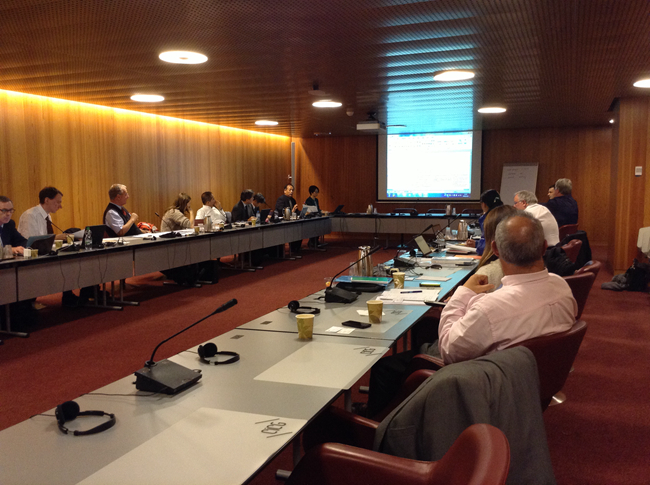The 1st IEC/JWG7 (International Electrotechnical Commission/Joint Working Group 7) meeting on the standardization formulation of flow battery systems for stationary applications was successfully held at the CICG (Geneva International Conference Centre), Geneva, Switzerland, from 12th to 16th January 2015. More than 20 experts from China, Japan, Spain, Austria, Switzerland and some other European nations attended this meeting. Three draft standards of flow battery systems for stationary applications, including the Project IEC 62932-1: General aspects, terminology and definitions (Europe), the Project IEC 62932-2-1: Performance general requirement & method of test (China) and the Project IEC 62932-2-2: Safety requirements (Japan) have been discussed on this meeting. Based on the serious discussion, the latter two draft standards (IEC 62932-2-1 and IEC 62932-2-2) have been approved by the working group.
Professor Huamin Zhang at DICP, the project leader of IEC 62932-2-1: Performance general requirement & method of test, has actively promoted the progress of the international standardization formulation. By the Chinese delegations’ efforts, the 1st draft standard on ‘Performance general requirement & method of test’ was completely compiled and submitted to the international expert group in July, 2014. During the 1st IEC/JWG7 meeting, Professor Huamin Zhang presented the deliberations on the draft standard on ‘Performance general requirement & method of test’. The working group affirmed the draft standard, and finally formed the accepted amendments through the considerate communication and coordination, and then proposed that the 2nd draft standard should be submitted in March, 2015.
The successful formulation of the 1st draft standard on ‘Performance general requirement & method of test’ indicated that the flow battery technology and the relating test/evaluation method in China have been recognized by the international counterparts.
The 1st IEC/JWG7 (International Electrotechnical Commission/Joint Working Group 7) meeting on the standardization formulation of flow battery systems for stationary applications was successfully held at the CICG (Geneva International Conference Centre), Geneva, Switzerland, from 12th to 16th January 2015. More than 20 experts from China, Japan, Spain, Austria, Switzerland and some other European nations attended this meeting. Three draft standards of flow battery systems for stationary applications, including the Project IEC 62932-1: General aspects, terminology and definitions (Europe), the Project IEC 62932-2-1: Performance general requirement & method of test (China) and the Project IEC 62932-2-2: Safety requirements (Japan) have been discussed on this meeting. Based on the serious discussion, the latter two draft standards (IEC 62932-2-1 and IEC 62932-2-2) have been approved by the working group.
Professor Huamin Zhang at DICP, the project leader of IEC 62932-2-1: Performance general requirement & method of test, has actively promoted the progress of the international standardization formulation. By the Chinese delegations’ efforts, the 1st draft standard on ‘Performance general requirement & method of test’ was completely compiled and submitted to the international expert group in July, 2014. During the 1st IEC/JWG7 meeting, Professor Huamin Zhang presented the deliberations on the draft standard on ‘Performance general requirement & method of test’. The working group affirmed the draft standard, and finally formed the accepted amendments through the considerate communication and coordination, and then proposed that the 2nd draft standard should be submitted in March, 2015.
The successful formulation of the 1st draft standard on ‘Performance general requirement & method of test’ indicated that the flow battery technology and the relating test/evaluation method in China have been recognized by the international counterparts.
